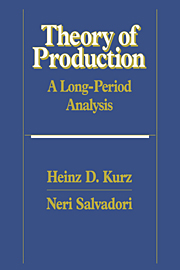Book contents
- Frontmatter
- Contents
- Preface
- A reader's guide
- 1 Free competition and long-period positions
- 2 A one-commodity model
- 3 Two-commodity models
- 4 Models with any number of commodities
- 5 Choice of technique
- 6 Alternative descriptions of a technique
- 7 Fixed capital
- 8 Joint production
- 9 Jointly utilized machines
- 10 Land
- 11 Persistent wage and profit rate differentials
- 12 On limits to the long-period method
- 13 Production as a circular flow and the concept of surplus
- 14 The neoclassical theory of distribution and the problem of capital
- 15 On some alternative theories of distribution
- Mathematical appendix
- References
- Name index
- Subject index
15 - On some alternative theories of distribution
Published online by Cambridge University Press: 06 January 2010
- Frontmatter
- Contents
- Preface
- A reader's guide
- 1 Free competition and long-period positions
- 2 A one-commodity model
- 3 Two-commodity models
- 4 Models with any number of commodities
- 5 Choice of technique
- 6 Alternative descriptions of a technique
- 7 Fixed capital
- 8 Joint production
- 9 Jointly utilized machines
- 10 Land
- 11 Persistent wage and profit rate differentials
- 12 On limits to the long-period method
- 13 Production as a circular flow and the concept of surplus
- 14 The neoclassical theory of distribution and the problem of capital
- 15 On some alternative theories of distribution
- Mathematical appendix
- References
- Name index
- Subject index
Summary
In the previous chapter we have seen how the neoclassical theory of distribution attempts to explain all distributive variables in terms of a single principle: that of the (relative) scarcity of labor(s), land(s), and capital. We have also seen the difficulties in which the different versions of that theory got entangled. In this chapter some non-neoclassical approaches to the theory of distribution will be summarized. Attention will focus on the determination of the real wage rate and the rate of profit. It will be assumed that land of the best quality abounds and that labor is homogeneous. (For a discussion of the case of scarce land(s) and heterogeneous labor, see Chapters 10 and 11, respectively.)
Before we begin with our overview, it is useful to recall that the criticism of the neoclassical theory of distribution has shown that the concept of “normal position,” or “long-period equilibrium,” is incompatible with a symmetric treatment of all distributive variables in terms of demand and supply. This is indeed reflected in one way or another by the theories sketched in this chapter, in which one of the two distributive variables is treated as a residual. Depending on which of the two variables is determined independently and which is considered a residual, the theories may be grouped as follows: (i) those that attempt to determine the real wage rate; and (ii) those that attempt to determine the rate of profit.
Information
- Type
- Chapter
- Information
- Theory of ProductionA Long-Period Analysis, pp. 468 - 491Publisher: Cambridge University PressPrint publication year: 1995
